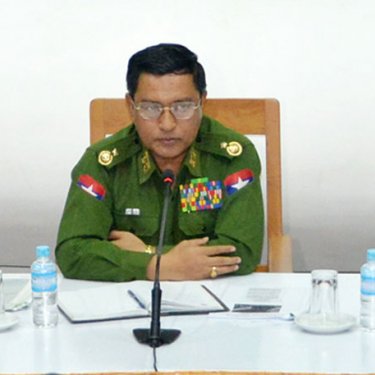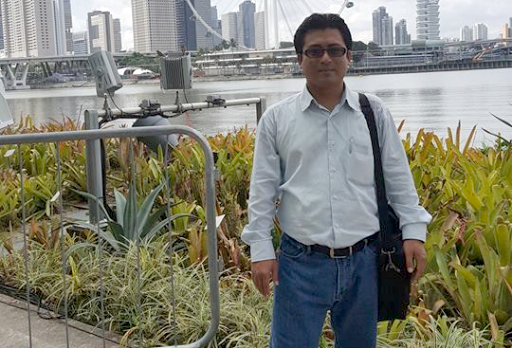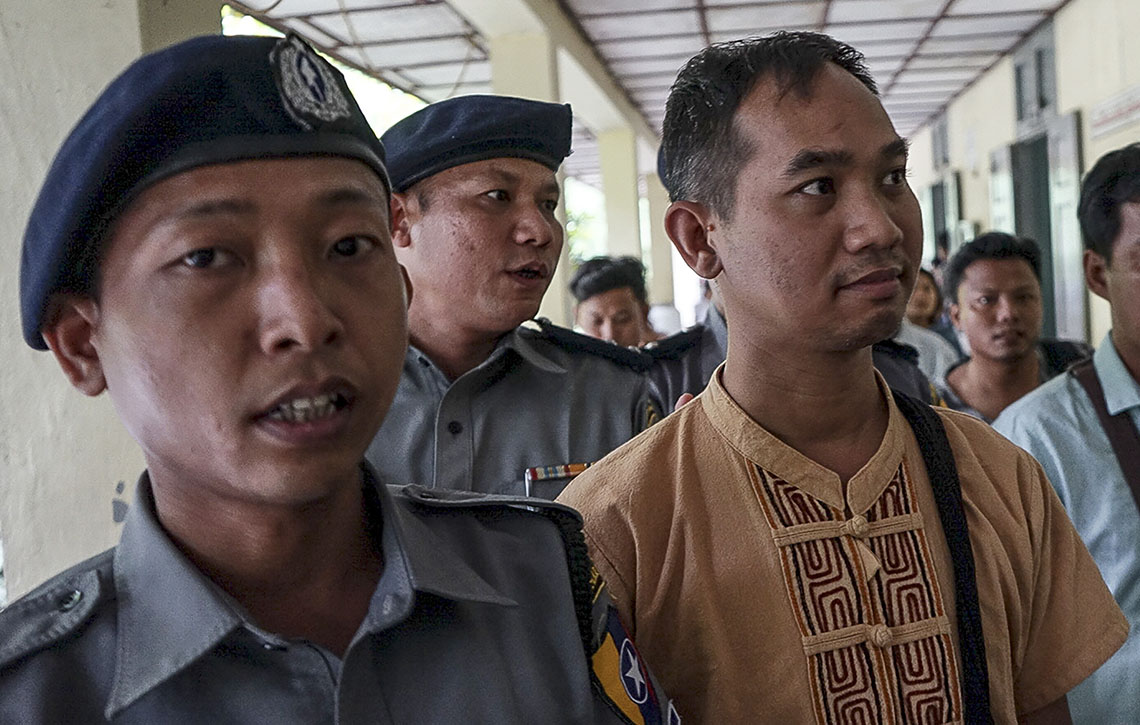Surge in judicial harassment of journalists by military and police in Myanmar

Two months after Reuters journalists Wa Lone and Kyaw Soe Oo were pardoned and released, Reporters Without Borders (RSF) is very concerned about a surge in cases of journalists being threatened, intimidated and jailed in Myanmar as a result of judicial harassment by the military and police.
The victims include Aung Kyi Myin, a video reporter held for the past seven weeks in Patheingyi, in the central Mandalay region, who begged the judge “to find the truth behind this case” and to “resist pressure from Mandalay’s police chief and public security minister” when he last appeared in court on 28 June, sources told RSF.
Aung Kyi Myin, who uses the pseudonym of Nanda to report for Channel Mandalay TV, was arrested on 15 May, a day after providing live video coverage of a clash between police and villagers who were protesting against a cemetery in the district of Pyin Oo Lwin.
He spent a month in detention before formal charges were finally brought against him under articles 114, 147, 332, 333 and 353 of Myanmar’s criminal code, charges that boil down to an accusation of violence against the police and the army, an absurd accusation that Channel Mandalay TV editor Min Din denies outright, pointing to the evidence of the video. Although he was just reporting the news, Nanda is now facing the possibility of total combined sentence of 17 years in prison.
“Hard to survive”
“Nanda has already had to pay an unacceptable price simply for doing his job and should be freed immediately and unconditionally,” said Daniel Bastard, the head of RSF’s Asia-Pacific desk.
“Everything in his case – the manner of his arrest, the length of his initial detention, and the spurious nature of the charges brought against him – is symptomatic of the judicial harassment to which too many journalists are subjected in Myanmar and which is designed to send a chilling message to the entire media profession.”

Win Naing Oo, a journalist with whom Nanda founded Channel Mandalay TV five years ago, is the subject of a criminal defamation action by a member of the Tatmadaw, Myanmar’s armed forces, over a story about illegal expropriations in the region.
“With one of us in prison and the other on bail, it is really hard for us to survive and keep presenting news,” he told RSF.
At least 51 journalists have been the victims of this kind of judicial harassment since a civilian government led by Aung San Suu Kyi was established in 2016. And, with a year and a half to go to general elections at the end of 2020, the frequency of these harassment cases is currently on the rise.
“Safe and undisclosed location”
In Demoso, a town in the eastern state of Kayah, three journalists with Democratic Voice of Burma (DVB), Eleven Media Group and Kantarawady Times are facing up to five years in prison in a case brought against them by Capt. Aung Myo Tun, the head of the local army battalion, for filming a protest by farmers outside the battalion’s headquarters on 19 June against its expropriation of local land. He accuses the journalists of trespassing on army property.

Excerpt from Aung Marm Oo's Twitter profile.
The situation is far more complicated for journalists in the far west the country, in Rakhine State, where fighting between the armed forces and the separatist Arakan Army recently intensified. This is particular so for journalists with the Development Media Group (DMG), a news agency based in Sittwe, the provincial capital.
DMG’s founder and director, Aung Marm Oo, recently told Voice of America’s Burmese service that he was hiding “in a safe and undisclosed location” in which “I dare not even think about my personal security at the hands of the army and Special Branch,” referring to Myanmar’s secret police.
Aung Marm Oo went into hiding after a warrant for his arrest was issued in May under the law on illegal association. Shortly before that he received an email that warned DMG, “to stand by the one and only army, the Tatmadaw,” or else “we will not guarantee the lives of your journalists.””
Endless litany
Previously, on 12 April, it was the editor of the Burmese version of The Irrawaddy, Ye Ni, who was the target of a prosecution brought by the army over a report about the situation in Rakhine State – a report deemed to have portrayed the security forces in an “unfair” light.
Against the backdrop of this seemingly endless litany of judicial harassment cases against journalists, only the faintest glimmer of hope came from the announcement on 2 July that charges were finally being dropped against Myanmar Now news website editor Swe Win.

Swe Win, the editor of Myanmar Now, is escorted to a court by police in Mandalay on July 31, 2017 (photo : AFP).
Accused of defamation by a follower of the fundamentalist Buddhist monk Ashin Wirathu, he was arrested on 30 July 2017 and then freed on bail. During the next two years, he had to attend a total of 71 hearings before a court in Mandalay, each one requiring a 16-hour road trip for this Yangon resident. He confirmed to RSF that legal actions of this kind can have a devastating impact on journalists’ work.
After falling seven places in the past two years, Myanmar is ranked 138th out of 180 countries in RSF’s 2019 World Press Freedom Index.



